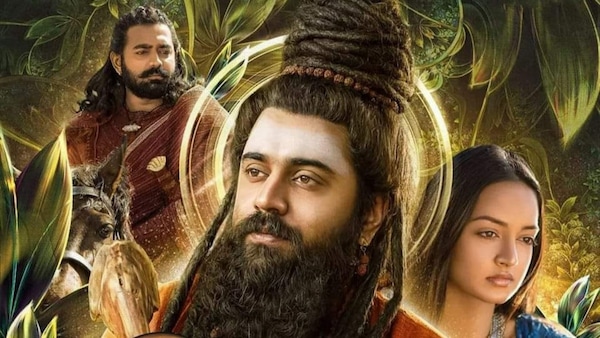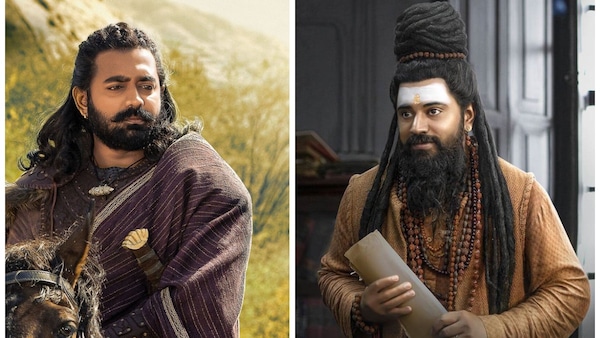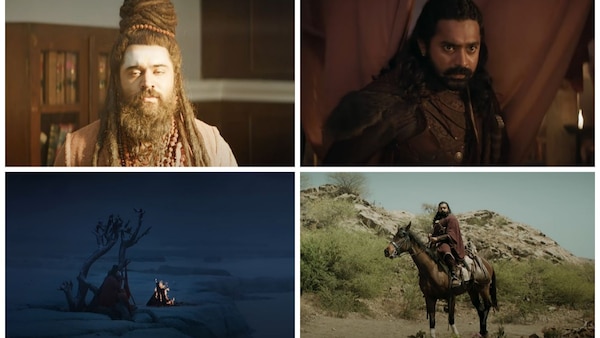Mahaveeryar review: Nivin Pauly’s courtroom, fantasy drama is a brilliant satirical take on the abuse of power
Credit though must be given to the makers to not spoon feed the audience; in fact, it’s a movie where the makers doesn’t underestimate the intelligence of the audience and the content of the film, which is mostly satirical, works best when people can draw parallels to what’s happening in the real world

Last Updated: 02.30 PM, Jul 21, 2022
Story: An ascetic named Apoornananthan is charged with the case of stealing a temple idol. The police further add more charges and the witness with their perceptions of the ascetic, who was a stranger to them, further strengthen the case against him. Apoornananthan defends himself, clearing the ambiguities one by one and also exposing the bias. Through his defense, he also introduces the role that time has played, finally drawing parallel with another case revolving around a king, who had asked his minister to procure for him the most beautiful girl in his kingdom.
Review: Director Abrid Shine’s filmography is a testament of sorts that the filmmaker refuses to be tied down to a genre. After his superhit coming-of-age drama 1983, he helmed the genre-defining Action Hero Biju before choosing to do the rooted-to-reality Poomaram and Malayalam’s first martial arts-based film The Kung Fu Master. But Mahaveeryar is his most ambitious film yet and probably the trickiest of them all – and the filmmaker passes that test by simplifying the concepts and yet dealing with a complex and relevant theme in the most satirical fashion.

It's safe to say that the movie has two distinct parts – that are connected cleverly through its character Apoornananthan (Nivin Pauly), an ascetic who finds defending himself in a court after being charged with the case of stealing a temple idol. Early on, the movie introduces a king (Lal), who has been suffering hiccups literally. The monarch orders his trusted minister (Asif Ali) to bring him the most beautiful woman in his kingdom and this sends the latter on a chase. How the two worlds collide in present day court and the consequences take the movie forward.
One of the highlights of Mahaveeryar is how Shine sets up the courtroom, where the drama unfolds extensively. Through Apoornananthan’s defense, the audience is taken through the concepts of bias, perceptions, how intangible emotions are weighed in court and the value they hold over facts and numbers. This is brought out well through Apoornananthan’s self-talk and his observations. The dialogues also pave the way for merging of two worlds in this fantasy, courtroom drama that uses the element of time travel, albeit in the most minimal way.
This element though where the movie juxtaposes the worlds is probably where there is a disconnect and throws off the audience a bit. Credit must be given to the makers to not simplify this; in fact, it’s a movie where the makers don't underestimate the intelligence of the audience and the content of the film, which is mostly satirical, works best when people can draw parallels to what’s happening in the real world.
What could have been a bland, preachy costume drama is elevated, several rungs above, through Abrid’s dialogues that might seem obtuse but have the power to pierce deep. Mahaveeryar at its core is about the abuse of power and through the parallels of what’s happening in the courtroom, it reflects how the State, judiciary and police and even individuals have the power to cause deep pain and anguish, while majority can only be silent observers as they are forced to believe that it’s done for the greater good or for love. The courtroom scenes involving Shanvi’s character will hurt to watch, despite how the makers have presented this. That is the intention and Abrid succeeds.

Mahaveeryar is also a film that sets a high benchmark in terms of storytelling. It weaves the elements of fantasy to tell a story that is entertaining as well as thought-provoking. Considering the content it tackles, that’s no mean feat and kudos to the team for pulling it off. The set design and locations of the movie add grandeur to these elements.
Nivin as Apoornananthan is fun to watch, ably shuttling between various emotions and never once appearing redundant. It’s again a character that could have come off as funny especially through the language he speaks, but the character’s look and body language interspersed with the film’s tone make the contrast work brilliantly.
Both Asif Ali and Lal showcase a different side through their respective characters. While the latter’s voice lends gravitas to his role, Asif surprisingly doesn’t look out of place at all as a warrior-minister from the past. Shanvi makes a great debut in Malayalam and though most of the film had her in the background, the important sequence in the film comes through her. Siddique, as the judge, stands out, effortlessly bringing comedy to the court proceedings when required and the actor is used well to stamp the satire in this movie. Vijay Menon, Major Ravi, Sudheer Karamana, Mallika Sukumaran, Sudheer Paravoor and Kalabhavan Prajod, Krishna Prasad and Padmaraj Ratheesh are all so aptly cast in the film, which deserves to be watched in a theatre for its visuals by Chandru Selvaraj.
Verdict: While Malayalam has had several courtroom dramas in the recent past such as Jana Gana Mana and Vaashi, Mahaveeryar stands out for its thought-provoking yet satirical storytelling. The lead actors take the backseat here and let the riveting script play out – making the audience draw parallels to what’s happening in the real world. The high standard of filmmaking is another reason to head to the theatres to catch this fantasy drama.
Subscribe to our newsletter for top content, delivered fast.

